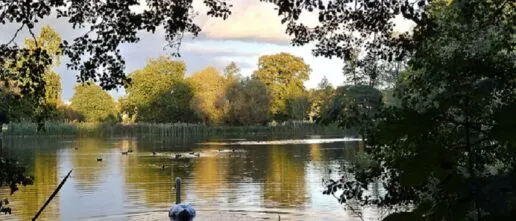My overall research interest lies in exploring, at the landscape scale, which components of biodiversity are the most crucial to protect and restore – given that ecosystems are dynamic, uncertain and subject to change. To do so, I work with simulation models and algorithms, large secondary (and occasionally primary) data sets, and spatial analysis of data including satellite imagery.
I have a particular interest in investigating the impacts of the private sector upon global biodiversity, and investigating mechanisms through which business can manage impacts and fund conservation and restoration activities.
Related Projects

Coordinating Research Around Biodiversity Net Gain
At its heart, BNG frames a challenging question: in a world where new housing, workplaces and other land use needs are deemed essential; is it possible to provide this infrastructure without Nature bearing the brunt of the costs?

Pioneering Nature-Positive Pathways: Organisational Approaches for delivering Nature Recovery
Understanding the methods and actions required by large organisations to deliver effective and equitable biodiversity outcomes in line with achieving global nature recovery goals.
Related Outputs
Nature Positive with Joseph Bull
In this episode we talk to Dr. Joseph Bull, Associate Professor in Climate Change Biology at the University of Oxford and find out what is meant by the term Nature Positive. We look at reasons for pragmatic optimism in the face of biodiversity decline and find out more about his work in the Aral Sea […]
Nature Seminar Series. Nature Positive – fact or fiction? Joe Bull, University of Oxford
Biodiversity loss is one of the great global challenges of our time. If we are ever to address and ultimately reverse biodiversity loss, we must face the difficult truth that amongst its most substantial drivers are consumption and trade. As such, to arrest declines in biodiversity, we may all have to change the way we […]
The Nature Positive Journey for Business: A research agenda to enable private sector contributions to the global biodiversity framework.
As a group of researchers and consultants working at the interface between business and biodiversity, we propose a conceptual model through which private sector contributions to a Nature Positive future could be realised and use it to identify priority research questions.
The “nature-positive” journey for business: A conceptual research agenda to guide contributions to societal biodiversity goals
Biodiversity is rising rapidly on the global agenda, prompting businesses to adopt the “nature-positive” framing, expressing a commitment to combat biodiversity loss and contribute to global nature recovery goals. However, realizing these ambitions requires transformative changes in business operations, which will be challenging given the uncertainties surrounding possible strategies and pathways. A research-driven approach for […]
PREPRINT: Navigating uncertainty in LCA-based approaches to biodiversity footprinting
The use of Life cycle assessment (LCA) methods is rapidly expanding as a means of estimating the biodiversity impacts of organisations across complex value chains. However, these methods have limitations and substantial uncertainties, which are rarely communicated in the results of LCAs. Drawing upon the ecological and LCA literature on uncertainty and two worked examples […]
Biodiversity offsets perform poorly for both people and nature, but better approaches are available
Highlights • Local planning constraints deliver poor biodiversity net gain (BNG) offsets • Removing those constraints results in significant BNG improvements • Alternatively, offsets can deliver gains in environmental access
‘Nature positive’ must incorporate, not undermine, the mitigation hierarchy
For the concept of nature positive to succeed as the lodestar for international action on biodiversity conservation, it must build upon lessons learned from the application of the mitigation hierarchy — or risk becoming mere greenwash.
PREPRINT: Biodiversity credits: learning lessons from other approaches to incentivize conservation
Biodiversity credits are an emerging vehicle for pro-environmental financing. Here we define and delimit biodiversity credits and explore the pathways through which credits can be issued. We scrutinize early evidence from pilots and suggest lessons from other market-based incentives for conservation and climate mitigation, including biodiversity offsets and forest carbon credits that have attracted large […]
Evaluating the impact of biodiversity offsetting on native vegetation
Biodiversity offsetting is a globally influential policy mechanism for reconciling trade-offs between development and biodiversity loss. However, there is little robust evidence of its effectiveness. We evaluated the outcomes of a jurisdictional offsetting policy (Victoria, Australia). Offsets under Victoria’s Native Vegetation Framework (2002–2013) aimed to prevent loss and degradation of remnant vegetation, and generate gains […]
Analyzing the outcomes of China’s ecological compensation scheme for development-related biodiversity loss
Over the past three decades, China’s government has implemented many projects under its ecological compensation policy, including paying compensation fees for habitat creation to redress natural habitat losses caused by development. However, a critical evaluation of both the policy design and its ecological outcomes, has not previously been carried out. We assemble diverse data sources […]
Improving the ecological outcomes of compensatory conservation by addressing governance gaps: a case study of Biodiversity Net Gain in England
Biodiversity compensation policies have emerged around the world to address the ecological harms of infrastructure expansion, but they have historically experienced weak compliance. The English government is introducing a requirement that all new infrastructure developments demonstrate they achieve a Biodiversity Net Gain (BNG). Previous research has highlighted governance gaps that risk undermining the policy’s ecological […]
Exploring the ecological outcomes of mandatory biodiversity net gain using evidence from early-adopter jurisdictions in England
Net outcome-type biodiversity policies are proliferating globally as perceived mechanisms to reconcile economic development and conservation objectives. The UK government’s Environment Bill will mandate that most new developments in England demonstrate that they deliver a biodiversity net gain (BNG) to receive planning permission, representing the most wide-ranging net outcome type policy globally. However, as with […]
Incorporating local nature-based cultural values into biodiversity No Net Loss strategies
Achieving “No Net Loss” (NNL) of nature from a development typically requires projects to follow a ‘mitigation hierarchy’, by which biodiversity losses are first avoided wherever possible, then minimised or remediated, and finally any residual impacts offset by conservation activities elsewhere. Biodiversity NNL can significantly affect people, including their cultural values. However, empirical research is […]
No net loss for people and biodiversity
Badly planned offsets can exacerbate poverty, and development and offset impacts can vary across spatial-temporal scales and by location, gender, and livelihood. We conceptualize the no-worse-off principle in the context of NNL of biodiversity, by exploring for whom and how the principle can be achieved.
Importance of Baseline Specification in Evaluating Conservation Interventions and Achieving No Net Loss of Biodiversity
When setting objectives for conservation activities, or judging their efficacy after implementation, an appropriate frame of reference against which evaluation is made should be specified. We developed 2 models to investigate the implications of setting different frames of reference in regions subject to various biodiversity trends and anthropogenic impacts.
Alternative Life Cycle Impact Assessment Methods for Biodiversity Footprinting Could Motivate Different Strategic Priorities: A Case Study for a Dutch Dairy Multinational
To design effective biodiversity strategies, corporations must address uncertainties in biodiversity footprinting methods, and further research is needed to ensure these methodologies drive effective action to combat global biodiversity loss.
Assessing the implications of a ‘Net Zero’ strategy for biodiversity
Climate change and biodiversity loss are closely linked crises. ‘Net Zero’ and ‘Nature Positive’ have emerged as frameworks for organisations to contribute towards societal climate and biodiversity goals.




